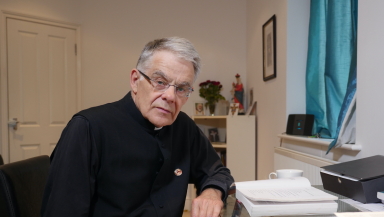
An NHS Trust in London has settled a discrimination case with a Catholic chaplain who says he was "ousted" after sharing his faith perspective on same-sex marriage with a patient who had asked for his opinion.
Rev Dr Patrick Pullicino was let go by the South West London and St George's Mental Health NHS Trust a few months after the conversation with the patient in August 2019.
The male patient had asked to speak to a Catholic chaplain. During their meeting, the patient confided in Dr Pullicino that he wanted to marry his male partner and that his father was upset with him because of this.
When he asked the chaplain for his opinion about the matter, Dr Pullicino told the patient that he might also be upset if he were in his father's position.
After the patient complained to the Trust, an investigation was launched into Dr Pullicino's conduct.
He says he was told that NHS policy on equality and diversity "supersedes religious standing whilst working and representing the Trust", and that "he had no rights".
A few months later, the Trust told Dr Pullicino that he was being let go due to "the budgetary constraint".
A trial had been scheduled for July at Croydon Employment Tribunal after Dr Pullicino launched legal action against the Trust, claiming harassment, religious discrimination, and victimisation.
The Trust has now settled with Rev Pullicino by awarding him £10,000 in compensation "for perceived injury to feelings".
Responding to the settlement, Dr Pullicino said he was "pleased and relieved" by the outcome and that it had been "crucial to expose the NHS's disturbing approach to the standard expression of Christian beliefs".
He has called for an urgent government inquiry.
"The documented downgrading of Christian belief by the Chief Executive undermines not only her NHS Trust but also all the patients under her care as well as the chaplains of different faiths that she employs," he said.
"There is a tendency throughout the NHS to force their patients to accept generic 'spiritual' care instead of giving support for their Christian beliefs. Christian faith is particularly important in sickness, particularly when in danger of death.
"Limiting this is inhumane, in addition to being outside the law. Good, religion-specific chaplaincy support is under threat in the NHS but is essential in all hospitals. A government inquiry is urgently needed into restoring hospital chaplaincy to its rightful place."
Andrea Williams, chief executive of the CLC, said it was "time to see an end to the ideology of equality and diversity riding roughshod over the Christian faith and treating it with such little respect".
She added that Dr Pullicino's story reflected a worrying trend that "NHS chaplains risk punishment for responding to questions on human sexuality with standard biblical teaching".
"They live under pressure to self-censor, affirm at all costs, or face the consequences. This has to change," she said.
"We will continue to defend and contend to keep chaplains at the heart of our public institutions."
A spokesperson from South West London and St George's Mental Health NHS Trust said: "We are pleased that we have agreed an outcome with Mr Pullicino which avoids the need for further proceedings.
"We remain absolutely committed to promoting equality, diversity and inclusion (EDI) for our patients, staff and communities. We respect and celebrate all protected characteristics equally, including religion, race, sexual orientation, disability, age, sex, gender reassignment, marriage and civil partnership, and pregnancy and maternity.
"We take seriously our responsibility to ensure patients' spiritual needs are met and we oppose any form of discrimination. We seek to protect all patients and members of staff in line with the Equality Act 2010."













